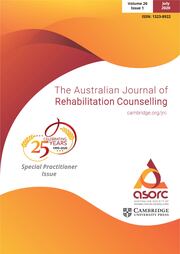No CrossRef data available.
Article contents
The Coach Approach
Published online by Cambridge University Press: 27 August 2015
Abstract
In the developing field of Life Coaching, Rehabilitation Counsellors can find an approach that when applied in the Rehabilitation setting can get real results. The profession of life coaching is discussed with regard to its origins and applications, and then compared to the field of psychology and rehabilitation counselling. The ‘Coach Approach’ is offered as an exciting new paradigm that creates an effective partnership in assisting clients to reach their full potential.
- Type
- Articles
- Information
- Copyright
- Copyright © Cambridge University Press 1999
References
Anderson, T. P. (1975). An alternative frame of reference for Rehabilitation: The helping process versus the medical model. Archives of Physical Medicine and Rehabilitation, 56, 101–104.Google ScholarPubMed
Australian Society Of Rehabilitation Counsellors NSW (1999) “What is Rehabilitation Counselling?: www.cchs.usyd.edu.au/Academic/CH/asorc.html (15/2/00)Google Scholar
Glich, S. J. (1953). Vocational, educational, and recreational needs of the cerebral palsied adult. New York: Springer-Verlag.Google Scholar
Rosenthal, R. & Jacobson, L. (1966). Teachers' expectancies: Determinants of Pupils IQ gains. Psychological Reports, 19, 115–118.CrossRefGoogle ScholarPubMed
Rubenfield, P. (1988) The Rehabilitation Counsellor and the Disabled Client: Is a partnership of equals possible? In Contemporary Challenges to the Rehabilitation counselling Profession. Maryland: Brooks.Google Scholar


